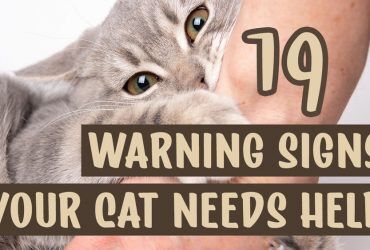If you notice any of the 19 warning signs that your cat needs help, seek veterinary assistance immediately. Neglecting your cat’s symptoms could lead to serious health issues or even death.
Cats may hide their pain or discomfort until it becomes unbearable, so it’s crucial to pay attention to any changes in behavior or habits. Regular check-ups can also help catch any potential health problems early on. In this article, we will explore the warning signs that your cat needs help, so you can ensure your furry friend receives the proper care they need.

Credit: kstp.com
The Importance Of Knowing Your Cat’S Habits
Knowing your cat’s habits is essential in determining whether there are any significant changes that may need attention. Understanding your cat’s routine can help you identify any changes in behavior that may require a vet’s attention. Sometimes, things like lethargy, loss of appetite, or other unusual behaviors could be caused by health issues.
It’s important to know your cat’s normal behavior so you can distinguish changes and get them help. Paying attention to things like litter box habits, appetite, grooming, and playtime can give you insight into your cat’s normal routine and help you notice anything out of the ordinary.
Be careful not to ignore any behavior changes in your cat because they could indicate serious health issues that need immediate attention.
Signs Of Physical Distress
Cats are notorious for hiding signs of physical distress. However, changes in appetite or thirst could signify an underlying issue that needs attention. Vomiting or diarrhea may indicate digestive problems. Difficulty breathing could be due to an allergy or respiratory infection.
Limping or difficulty moving around may indicate joint pain or arthritis. It is important to contact a veterinarian if any of these signs are observed. Early intervention can prevent the condition from worsening and potentially harming the cat’s health.
Signs Of Mental Or Emotional Distress
Cats exhibiting signs of mental or emotional distress may require help. One such warning sign is excessive hiding or isolation, which may indicate that your pet is feeling anxious. Aggressiveness or irritability is another potential symptom. If you notice your cat’s sleep patterns have changed or they are exhibiting excessive sleepiness, it could be another warning sign.
Excessive grooming or scratching may also indicate that something is wrong. Keep an eye out for these and other warning signs, and consult a veterinarian as soon as possible if you suspect your cat needs help.
Additional Signs That Your Cat Could Be In Distress
Cats are known to hide their illnesses, and it can be hard to tell if they need help. Changes in vocalization, litter box habits, incontinence, excessive weight gain or loss, and coat condition can allbe warning signs. If your cat is meowing more than usual, it could be a sign of pain or sickness.
Changes in their litter box habits, like avoiding the litter box or using it more often, could be a sign of an infection. Incontinence can also be a sign that something is wrong. Excessive weight gain or loss and a poor coat condition can indicate an underlying health issue.
If you notice any of these symptoms, take your cat to the vet right away. Early detection and treatment can save your cat’s life.
Conclusion
So, if you spot any of these warning signs in your feline friend, you should take quick action and seek help from a veterinarian. Your pet depends on you to help them stay healthy and happy, and recognizing these signals of distress is a critical component of responsible pet ownership.
Remember that cats are creatures of habit and they communicate with us in their unique ways. They may not be able to speak like humans, but their actions speak louder than words. Keep a close watch on your cat’s behavior and appearance, and don’t hesitate to seek professional help if you suspect that something is wrong.
With proper care and attention, you can keep your beloved cat happy, healthy, and thriving for years to come.


